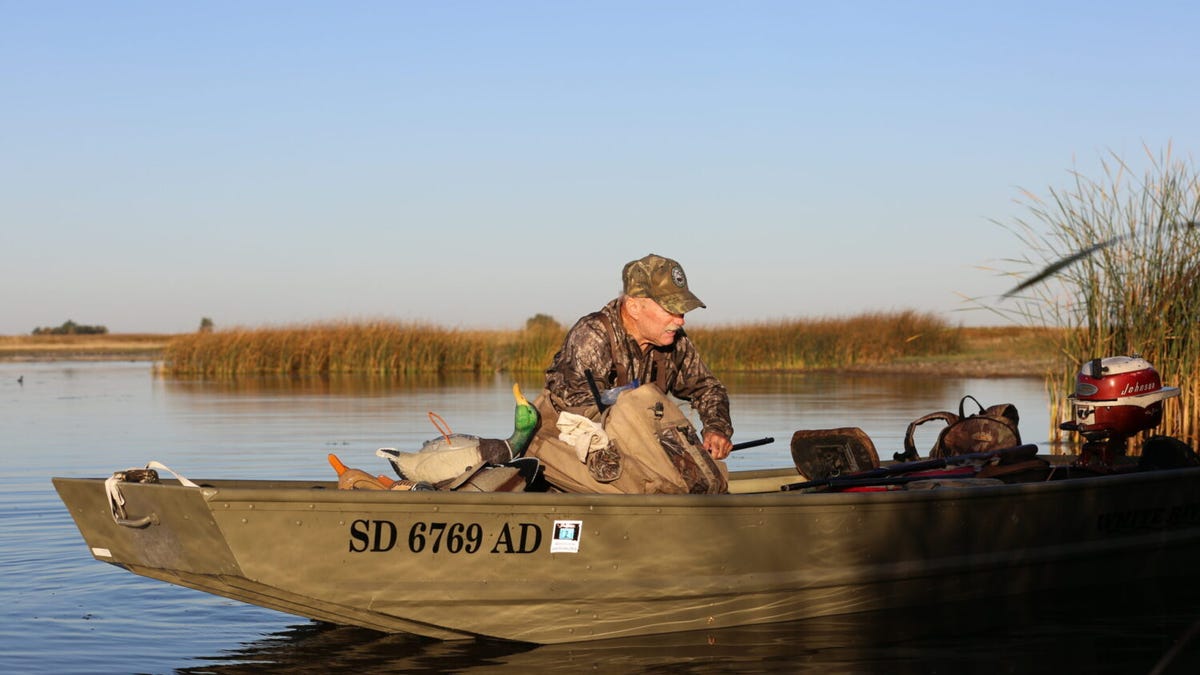Michigan
Michigan may have fewer deer hunters, but venison donations to food banks are up ⋆ Michigan Advance

Despite an ongoing trend in Michigan of fewer people heading into deer blinds, the amount of venison being donated to local food banks and other charities has been steadily increasing.
According to the Michigan Department of Natural Resources (DNR) 2022 Deer Harvest Survey, the total number of hunters declined by about 4% from 537,014 in 2021 to 516,336 last year. More significantly, the number of deer that were harvested dropped 14%, from approximately 395,000 in 2021 to just 339,189 in 2022.
In and of itself, that is not much of a surprise, as deer hunting, in general, has been steadily declining in Michigan over the last several decades. While 2020 saw a small increase largely attributed to the expanded interest in outdoor activities during the first year of the COVID pandemic, the annual deer harvest still pales in comparison to the peak seen in the late 1990s, when just under 600,000 deer were taken.
What is somewhat surprising is that over that same period, Michigan Sportsmen Against Hunger (MSAH) reports an inverse increase in donated deer meat.
Dean Hall is treasurer of the MSAH, an all-volunteer organization that connects hunters, wild-game processors and charities that feed individuals in need.
“Hunting license sales have indeed not enjoyed the amount of sales numbers as in past decades,” Hall told the Michigan Advance. However, he added that their tracking “shows increases in venison burger production as a result of deer donations.”
According to numbers provided by the group, while the number of deer harvested in Michigan dropped 14% from 2021 to 2022, the pounds of donated venison that were processed through their network rose by nearly 6%, from 107,012 pounds to 113,491 pounds.
In fact, while the number of deer hunters has been on the overall decline, MSAH reports a more than five-fold increase in donated venison over the past ten years, with more than 1.1 million pounds collected and donated between 1991 and 2022.
Hall said the increase in donated venison has several contributing factors.
“While sportsmen and sportswomen continue to support the MSAH mission in strength, additional deer donations come in from post season deer management efforts in the MetroPark System, city parks and townships where hunting is not allowed but deer management is a necessity, and deer management in specific counties of the State through the United States Wildlife Service,” he said.
MSAH is funded through an account in the state Treasury and promoted by the DNR as the “perfect way for hunters to share their harvest,” while they are encouraged to “offset the cost of processing, and packaging venison by making a monetary donation” when they purchase a hunting or fishing license.
According to the Michigan Wildlife Council, those monetary donations have also increased exponentially, from less than $1,000 in 2005 to approximately $100,000 in 2018.

Meanwhile, state wildlife officials say that while they encourage the continued donations by deer hunters, they also caution that only licensed processors like those utilized by MSAH should be used by those looking to purchase venison.
“Many people assume food items sold online are from licensed and inspected companies, but this is not always the case,” said Jennifer Bonsky, MDARD Food and Dairy Division acting director. “Before you buy any food, and at this time of year particularly venison, make sure the food was processed at a facility licensed by MDARD. Our staff works tirelessly to make sure businesses are following the law to keep your food safe and family healthy.”
Legally, hunters can only take their deer to an unlicensed meat processor if the venison is simply cut and wrapped, although that meat must be marked as “Not for Sale” and used for personal use/consumption by the hunter. While it can be shared with the hunter’s friends and family, it can not be resold. If further processing like grinding with added fat, sausage making, or smoking is needed, the processor must be licensed.
“The best way to tell if venison being offered for sale is being sold legally is to look at the label,” said Bonsky. “A proper label will list ingredients, weight of the product, the name, address and contact of the licensed food business, and have a best by date, if needed. You can also ask to see a copy of the seller’s food license.”
As for the long-term trend of the decline in hunting across Michigan, there are actually small signs of optimism, said Nick Buggia, chair of the Michigan Wildlife Council.
“According to statistics just released by the Michigan Department of Natural Resources, hunting license sales are generally holding steady compared with recent years — even increasing among some demographics — and that bodes well for all Michiganders,” he said.
While hunting license purchases were down slightly, a .79% decrease from the 459,490 bought in 2022, the purchase of first-time hunting licenses saw a .86% increase.
There was also a 3% upward swing from 2022 in the number of hunting licenses purchased by out-of-state visitors through Oct. 31.
That bodes well for the efforts of Michigan Sportsmen Against Hunger.
“Michigan hunters for decades have been donating venison to the hungry of our state,” Buggia said. “It’s just one of the ways sportsmen and sportswomen give back to their neighbors and fellow citizens.”

GET THE MORNING HEADLINES DELIVERED TO YOUR INBOX

Michigan
Washington transfer LB Khmori House sets Michigan visit

Michigan is expanding its board at linebacker during the winter transfer portal cycle by hosting the second linebacker target of the week.
Washington rising sophomore LB Khmori House is set to visit Ann Arbor on Sunday according to his agents.
House will join Georgia linebacker Troy Bowles as linebacker visits who have been on campus this week.
Maize & Blue Review can confirm that Bowles was on campus on Thursday.
House appeared in 9 games as a freshman for the Huskies this season, recording 33 total tackles, one forced fumble and an interception.
Stick with Maize & Blue Review for more Transfer Portal coverage.
—
Discuss this article with our community on our premium message boards
Not a subscriber to Maize & Blue Review? Sign up today to gain access to all the latest Michigan intel M&BR has to offer
Follow our staff on Twitter: @JoshHenschke, @Berry_Seth14, @TrevorMcCue, @DennisFithian, @BrockHeilig, @JimScarcelli, @Jerry_Diorio
Subscribe to our podcasts: Apple Podcasts, Google Podcasts and Spotify
Check out Maize & Blue Review’s video content on YouTube
Follow Maize & Blue Review on social media: Facebook, Twitter, TikTok, Instagram and BlueSky
Michigan
These 10 small mid-Michigan businesses just received nearly $200K in grants
SAGINAW, MI – Officials with the Great Lakes Bay Business Hub have announced the recipients of nearly $200,000 in direct grants to small businesses, and the application for the next round of grants is now open.
“After receiving over 29 competitive applications, ten small businesses have been awarded a total of $194,688.03 in funding,” reads a the Central Michigan University Research Corp. (CMURC) news release.
“This collaborative initiative, involving the Small Business Development Center, regional chambers of commerce, community and economic development organizations, and entrepreneurial service providers, are now accepting applications for the next round of grants, with a deadline of May 13.”
CMURC President and CEO Erin Strang said in a statement, “These grants are more than financial awards – they’re investments in entrepreneurs that drive positive social change, empower communities, and shape a stronger, more resilient future for generations to come.”
“By championing small business growth, we’re building the foundation for lasting regional impact.”
The recipients, representing Bay, Clare, Midland, Isabella and Saginaw counties, are:
- Allegiance Home Healthcare Agency
- Barney’s Bakehouse Bakery LLC
- BreAna Allen Consulting LLC
- Clare Family Fitness Inc.
- My Angel Adult Foster Care LLC
- New Beginnings Learning Center LLC (Sweet Angels Childcare)
- Nor’East Outdoors LLC
- Solutions Behavioral Health LLC
- Tarsha Works Consulting
- Unplugged Outfitters LLC
The nearly $200,000 in direct grants to these small businesses will make “significant impacts,” officials said, “with recipients using the funds to purchase equipment, expand operations, and create new jobs, fueling economic development across the region.”
“I am honored to have been selected as a recipient of the Direct to Business Grant opportunity and am grateful for the experience of working with Great Lakes Bay Business Hub, which has provided me with valuable knowledge and resources,” Iesha Johnson, owner of Allegiance Home Healthcare Agency, said in a statement.
“In response to this award, our plan is to create a positive impact in our community by promoting economic growth, creating jobs, providing training, and expanding care services to those in need. I sincerely thank GLBBH for this incredible opportunity.”
The Great Lakes Bay Business Hub (GLBBH) is a resource for business support and workspace solutions across the Great Lakes Bay Region. GLBBH aims to strengthen existing resources and deliver impactful programs and services through partnerships with key regional entities, including CMURC, Michigan Economic Development Corp., Michigan Small Business Development Center, and the Great Lakes Bay Regional Alliance, the release states.
At the county level, Bay County includes the Bay Area Chamber of Commerce and Bay Future; Midland County is represented by the Midland Business Alliance; Isabella County encompasses the Middle Michigan Development Corp. and Mount Pleasant Chamber of Commerce; Saginaw County includes the Saginaw County Chamber of Commerce and Saginaw Future; and Gratiot, Clare, Gladwin and surrounding counties have the ability to participate as well.
Businesses and entrepreneurs across the region are encouraged to apply for the next round of grant funding by May 13. For more information about the grant program and to submit an application, visit workgreatlakesbay.com.
Want more Bay City- and Saginaw-area news? Bookmark the local Bay City and Saginaw news page or sign up for the free “3@3″ daily newsletter for Bay City and Saginaw.
Michigan
A lynching in the family inspired Michigan's first Black woman elected justice to pursue the law

LANSING, Mich. – During Michigan Supreme Court Justice Kyra Harris Bolden’s first campaign, a critic told her she wasn’t Michelle Obama or Kamala Harris, “but you feel emboldened to run for this office.”
She later named her first child Emerson, so it could be shortened to “Em Bolden.” The word has driven her ever since.
Bolden, now 36, won that race, for the statehouse in 2018, and in 2022 she was appointed as the youngest-ever justice, and first Black woman, on Michigan’s top court. Voters affirmed Gov. Gretchen Whitmer’s choice by electing Bolden to her seat in November.
“It’s been a long journey for me,” Bolden told The Associated Press, one that began generations ago when her great-grandfather was lynched and her family fled the South.
Michigan has a long legacy of electing women to its highest court. When Democratic-backed candidate Kimberly Ann Thomas joins Bolden on the bench in January, five of the seven justices will be women. It is the sixth time a female majority has made up the court, according to the Michigan Supreme Court Historical Society.
But only 41 Black women have ever served on a state supreme court, according to the Brennan Center for Justice, which tracks diversity in the judicial system.
Bolden’s election means that Black people in Michigan — about 14% of the population — still have representation. Across the state line in Ohio, where Justice Melody Stewart had been the first Black woman justice, her reelection loss makes for an all-white court.
In Kentucky, Court of Appeals Judge Pamela Goodwine became the first Black woman elected justice. Kentucky also will have its first female chief justice and, for the first time, a female majority.
It was an act of racial terror that sent Bolden on her path to the court. She didn’t know the details until she was nearly a college graduate in psychology and spent some time with her aging maternal great-grandmother, who shared family recipes and history, including what really happened to Jesse Lee Bond.
According to the Equal Justice Initiative, Bond was lynched in 1939 in Arlington, Tennessee, after asking a store owner for a receipt. Bond was fatally shot, castrated and dumped in the Loosahatchie River. Two men were swiftly acquitted in the murder.
Bolden said she is still trying to reconcile with the trauma this caused.
“I wanted families to see justice in a way my family had not seen justice,” she told the AP.
So she took action: earning her degree at Detroit Mercy Law School and working as a defense attorney before serving on the House Judiciary Committee, where she pursued criminal justice reform and domestic violence prevention.
“She believes in justice and believes in fairness for everybody,” said her mother, Cheryl Harris, with pride heavy in her voice. “And to see her in this position — it’s making me tear up right now.”
Goodwine, for her part, said she was inspired as a teenager by the work of Thurgood Marshall, the first Black U.S. Supreme Court Justice. She started as a court stenographer and worked her way up through the four court levels of Kentucky, making history at almost every step along the way.
“It is absolutely essential that our younger generations are able to see someone who looks like them in every position, particularly a position of power,” Goodwine said.
Bolden broke another barrier knocking on doors as the first Michigan Supreme Court candidate to run while pregnant, according to Vote Mama Foundation, a group that tracks mothers running for office.
“There are so many people that don’t know that this is achievable,” Bolden said.
U.S. Rep. Brenda Lawrence, a Michigan Democrat who served in Congress from 2015 through 2022, spent years working to see a Black woman like herself serve as a justice.
“I just sit back, you know, with such pride,” Lawrence said. “She’s a hard worker and she’s what the state needs.”
___
The Associated Press’ women in the workforce and state government coverage receives financial support from Pivotal Ventures. The AP is solely responsible for all content. Find AP’s standards for working with philanthropies, a list of supporters and funded coverage areas at AP.org.
Copyright 2024 The Associated Press. All rights reserved. This material may not be published, broadcast, rewritten or redistributed without permission.
-

 Politics1 week ago
Politics1 week agoCanadian premier threatens to cut off energy imports to US if Trump imposes tariff on country
-
/cdn.vox-cdn.com/uploads/chorus_asset/file/25782636/247422_ChatGPT_anniversary_CVirginia.jpg)
/cdn.vox-cdn.com/uploads/chorus_asset/file/25782636/247422_ChatGPT_anniversary_CVirginia.jpg) Technology1 week ago
Technology1 week agoInside the launch — and future — of ChatGPT
-
/cdn.vox-cdn.com/uploads/chorus_asset/file/25789444/1258459915.jpg)
/cdn.vox-cdn.com/uploads/chorus_asset/file/25789444/1258459915.jpg) Technology7 days ago
Technology7 days agoOpenAI cofounder Ilya Sutskever says the way AI is built is about to change
-

 Politics7 days ago
Politics7 days agoU.S. Supreme Court will decide if oil industry may sue to block California's zero-emissions goal
-
/cdn.vox-cdn.com/uploads/chorus_asset/file/25546252/STK169_Mark_Zuckerburg_CVIRGINIA_D.jpg)
/cdn.vox-cdn.com/uploads/chorus_asset/file/25546252/STK169_Mark_Zuckerburg_CVIRGINIA_D.jpg) Technology1 week ago
Technology1 week agoMeta asks the US government to block OpenAI’s switch to a for-profit
-

 Politics1 week ago
Politics1 week agoConservative group debuts major ad buy in key senators' states as 'soft appeal' for Hegseth, Gabbard, Patel
-

 Business5 days ago
Business5 days agoFreddie Freeman's World Series walk-off grand slam baseball sells at auction for $1.56 million
-
/cdn.vox-cdn.com/uploads/chorus_asset/file/23951353/STK043_VRG_Illo_N_Barclay_3_Meta.jpg)
/cdn.vox-cdn.com/uploads/chorus_asset/file/23951353/STK043_VRG_Illo_N_Barclay_3_Meta.jpg) Technology5 days ago
Technology5 days agoMeta’s Instagram boss: who posted something matters more in the AI age




















